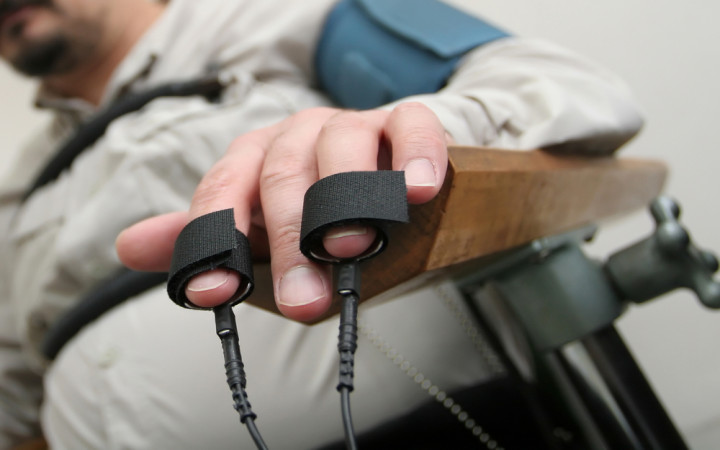Today’s Wonder of the Day was inspired by Dominic. Dominic Wonders, “how does a lie detector work” Thanks for WONDERing with us, Dominic!
We’ve all been in a similar situation in the past. A family member walks into the kitchen. They find that someone ate the last of their favorite snack. That’s when the questions come. “Who did this?” “Was it you?”
If you’re the guilty one, you have two options. You can tell the truth and face the consequences. Or you can try to tell a convincing lie. We urge you to tell the truth. Lying isn’t a good habit to develop. Besides, your family can probably tell when you’re not being truthful!
Of course, not everyone can rely on those instincts. For example, police officers often need to find out if a person is being honest. How can they tell the truth from a lie? Sometimes, they turn to a special tool called a polygraph machine.
A polygraph machine is also known as a “lie detector.” You may have seen these machines used in movies or TV shows. Have you ever wondered whether they can really tell when someone is lying?
Polygraph machines work by measuring certain bodily functions. This includes skin conductivity, heart rate, blood pressure, and breathing. None of these are easily controlled by the mind. Many people believe measuring them can reveal when a person is not telling the truth. For example, a person’s blood pressure or heart rate might increase when they are dishonest.
What happens when a person takes a lie detector test? First, they are hooked up to the polygraph machine. Then, an examiner asks them a series of questions. First, they ask control questions. These have known answers, such as the person’s name and address.
The examiner measures the person’s bodily functions as they answer control questions. This sets a baseline reading. Then, they ask the key questions they don’t already know the answers to. They record the person’s responses. Examiners measure the person’s bodily functions in this step, too.
Sometimes, the examiner may notice a person starts breathing faster when answering key questions. Their heart may start to race. If this happens, the examiner may conclude that the person isn’t being honest.
How reliable are lie detector tests? Critics of polygraph machines believe that they aren’t stable. They say there are too many variables in play. Many courts agree. Lie detector results are often not admissible in trials.
Researchers have found that polygraph machines may detect lies in some cases. Still, they point out that the machines often make errors. For example, people have used some strategies to fool the lie detector.
Could you beat a lie detector? Maybe! One common strategy is trying to increase physical responses during the control questions. This could mean breathing faster or pinching yourself. This can set a false baseline on the control questions.
Some people claim they can beat a lie detector by getting a good night’s sleep. Others simply stay calm during the test. Some people mentally repeat the control questions to themselves as they answer the “real” questions. Doing so may help to control their bodies’ reactions.
On the other hand, sometimes examiners may conclude people are lying when they’re actually telling the truth. People often feel nervous when taking a lie detector test. Polygraph machines can read the body’s responses to anxiety as signs that a person is lying.
What do you think? Are polygraph machines reliable? Is there a better way to tell when someone is being honest? Maybe you can come up with a better lie detector! Still, try to remember that honestly is typically the best choice.
Standards: CCRA.L.3, CCRA.L.6, CCRA.R.1, CCRA.R.2, CCRA.R.4, CCRA.R.10, CCRA.SL.1, CCRA.SL.2




